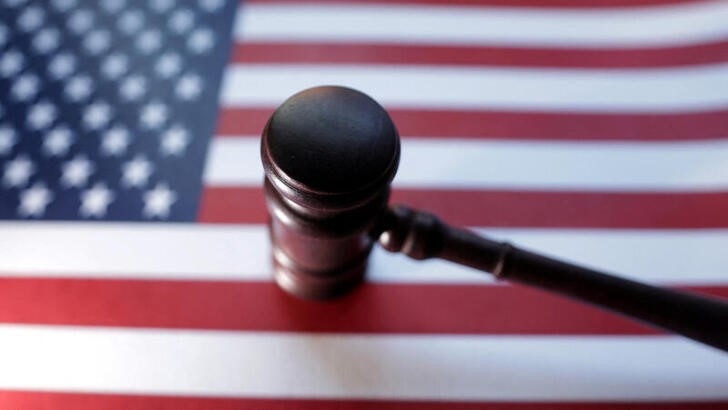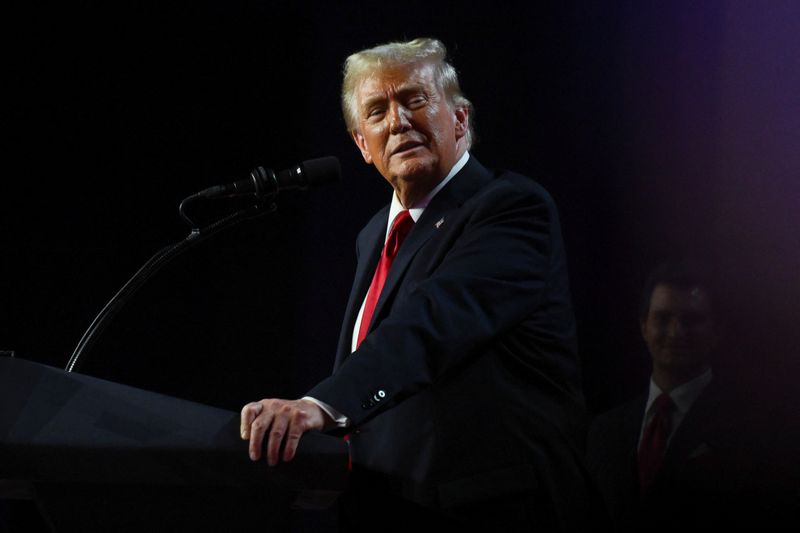By Nate Raymond (NS:RYMD)
(Reuters) - Republican President-elect Donald Trump is poised to build on his legacy of reshaping the federal judiciary with nominees who his allies and opponents predict could be even more conservative than the near-record 234 judges he put on the bench in his first stint in office.
With Republicans set to take back control of the Senate, which must confirm judicial nominees, Trump should enjoy an easy path to filling possible vacancies on the U.S. Supreme Court and the expected 100-plus seats that will likely open up on lower courts across the nation.
"Trump remade the federal judiciary in his first term, and now he has the opportunity to cement that vision for an entire generation," John Collins, a professor at George Washington University Law School, said in an email.
A new round of Trump-appointed, life-tenured judges would result in a more conservative federal judiciary that would be more likely to cast a skeptical eye on environmental, financial and other regulations and to uphold Trump's agenda in the face of legal challenges.
Representatives for Trump did not respond to a request for comment.
During his first four years in office, Trump's 234 judicial appointments included three U.S. Supreme Court justices, giving the high court its 6-3 conservative majority, and 54 judges named to 13 intermediate appeals courts. It marked the second-most judicial appointments of any president in a single term.
Those appointments shifted the judiciary to the right, with Republican appointees today making up half of all active appellate judges and having majorities on six circuit courts. Many had connections to the influential conservative legal group the Federalist Society and remain active with the organization.
Those judges often embrace "originalism," a legal philosophy that seeks to interpret the U.S. Constitution based on the text as understood at the time of its drafting in the 18th century.
That legal doctrine has formed the backbone of a series of rulings favoring conservative litigants in cases that have curtailed abortion access, expanded gun rights and limited government regulation.
While Trump in his first term from 2017 to 2020 turned to the Federalist Society's Leonard Leo as an adviser on judicial nominees, the Republican this time has surrounded himself with different conservative allies focused on judicial nominees.
Those include Mike Davis, a Trump ally and founder of the conservative judicial advocacy group Article III Project, who during Trump's first term was chief counsel for nominations to the then-chair of the Senate Judiciary Committee, Republican Senator Chuck Grassley, who is set to resume that role.
'BOLD AND FEARLESS JUDGES'
"I think that Trump's biggest and most consequential accomplishment of his first term was the transformation of the federal judiciary, and I hope he builds upon that in his second term with even more bold and fearless judges," Davis told Reuters in the run-up to Tuesday's election.
Davis, who had worked to help confirm Trump-appointed Supreme Court Justices Neil Gorsuch and Brett Kavanaugh, posted on social media platform X on Thursday that anyone wanting his help landing a job during Trump's presidency needed to provide "concrete evidence of your loyalty to Trump."
Some of Trump's appointees to the trial courts in his first term could be potential candidates to fill vacancies on key appeals courts, which often have the last word on cases given how few appeals the Supreme Court hears.
Davis has previously cited Florida-based U.S. District Judge Aileen Cannon, a Trump appointee who dismissed the classified documents criminal case against the now-incoming president, as the type of "fearless" judge Trump should seek to appoint.
Other prominent conservative trial court judges who could be eligible for a promotion include U.S. District Judge Matthew Kacsmaryk in Amarillo, Texas, who suspended approval of the abortion pill mifepristone. The U.S. Supreme Court in June preserved access to the pill, overturning an appellate court ruling that partly upheld Kacsmaryk's decision.
Another rising star among conservative judges is U.S. District Judge Kathryn Kimball Mizelle, a Trump appointee in Tampa, Florida, best known for declaring the Biden administration's COVID-19 mask mandate for airlines and other public transportation was unlawful.
The scope of Trump's ability to further reshape the judiciary will be limited by the number of vacancies he can fill.
He inherited 108 federal judicial vacancies when he took office in 2017, the most for an incoming president since Democratic then-President Bill Clinton in 1992.
Today, the federal judiciary has 47 seats currently vacant and 20 more that are expected to open up in the future, assuming their current occupants keep to their announced plans to move into semi-retirement. But outgoing Democratic President Joe Biden has nominees pending to fill 28 of those 67 seats.
Another 247 judges will be eligible to move into semi-retirement over the next four years, opening new vacancies, according to an analysis by the American Constitution Society, a progressive legal group.

But only 116 were appointed by Republicans, and research has shown that the vast majority of judges today time their decisions to take "senior status" to when the White House is occupied by a president of the same party as the one who appointed them.
Even with fewer vacancies, though, law school professor Collins said Trump "will likely be able to both lock in conservative majorities for the foreseeable future on some courts and narrow or flip liberal majorities on others."
